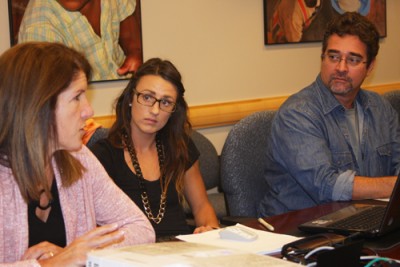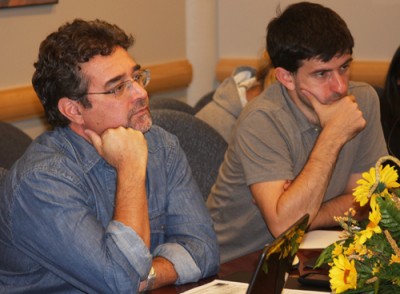
Kinesiology researchers at the Neag School of Education Human Performance Laboratory have been enjoying the collegiate company of a Brazilian visiting scholar. Dr. Paulo de Tarso Veras Farinatti, an associate professor from Rio de Janeiro State University’s Institute of Physical Education and Sports, arrived in late June through Brazil’s Science Without Borders program and has been working closely with UConn Board of Trustees Distinguished Professor of Kinesiology Dr. Linda Pescatello on her leading research projects in hypertension and exercise.
Funded by the Coordinating Office for the Advancement of Higher Education (CAPES) and National Council for Scientific and Technological Development (CNPq)—two organizations within Brazil’s Ministry of Education and Ministry of Science & Technology—Science Without Borders funds undergraduate students and senior researchers like Farinatti to study abroad at the world’s top universities as a way to promote scientific research and increase international cooperation within science and technology.
This exchange will allow Farinatti and Pescatello to work together for six months, though it won’t be their first collaboration. After meeting in 2009 in Brazil at the 13th International Symposium of Physical Activity and found they share similar research interests, the two published two research papers together. Science Without Borders, however, allowed them to morph their long-distance collaborations into in-person ones.

Since arriving in Storrs, Farinatti has been involved with Pescatello’s ongoing “Generating Reductions In Pressure” project, which is studying people’s blood pressure response to isometric handgrip and aerobic exercise. Working with Pescatello and graduate students, he’s also contributed to the “Syntheses of Prevention Intervention Research in Exercise” (SPIRE) project designed to examine the blood pressure response to exercise, with a focus on arterial stiffness, an emerging important risk factor for hypertension and cardiovascular disease, while using meta-analysis techniques.
“I’m very excited about what I’ve learned and experienced since I came here,” Farinatti said. “Once I’m back in Brazil, I’ll be able to introduce the research techniques and trends I’ve learned to my students, propose similar projects in my institution or in collaboration with UConn, and hopefully continue the cooperation between our two institutions.”
One of the evolving ideas, Pescatello said, is to develop research exchange opportunities through Science Without Borders that would allow UConn and Rio de Janeiro State University graduate students to travel, collaborate and add hands-on global perspectives to their work.
“Both institutions would hugely benefit,” Pescatello said.
Pescatello, in fact, is excited about the potential that future collaboration can bring: “A lot of researchers interested in the blood pressure response to exercise, what Dr. Farinatti particularly wants to learn more about, are located in Brazil, so collaboration has the potential to not just build bridges, but expedite the efforts of our study and research.”
In addition to learning new research techniques, Farinatti’s time with Pescatello has exposed him to the many facets of U.S. academia. Among other experiences, he has sat in on Pescatello’s graduate classes. He’s also shared many of his own classroom and research techniques.
“Our countries’ academic philosophies are quite different,” Pescatello said. “The chance to experience some of these differences will only help strengthen future collaborations.
One area ripe for collaboration, Farinatti said, is within a project sponsored by the City of Rio de Janeiro’s Secretary of Healthy Aging and Quality of Life, called 3rd Age Academy. Researchers from the Rio de Janeiro State University are conducting a project aimed at studying elderly peoples’ blood pressure responses to exercise in public physical activity facilities called exercise machines set up in almost 200 public squares. The prospect of UConn and Rio de Janeiro State University collaborating on—and helping expand—this kind of exciting project has only the potential to “fireball,” Farinatti added.
“Observing different cultures and ways of life really add a perspective to a person’s thinking,” Farinatti continued. “The benefit of our future collaboration will definitely reach beyond a scientific perspective, especially for young students. I can’t even measure the value of that.”
 Facebook
Facebook
 Twitter
Twitter
 LinkedIn
LinkedIn
